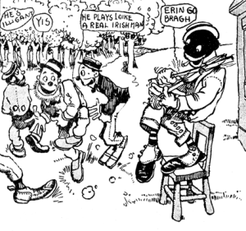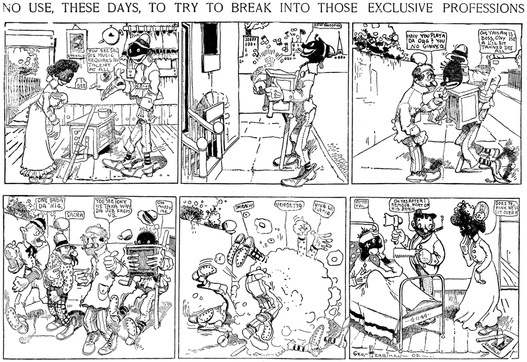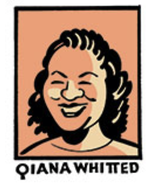|
Originally posted at Pencil Panel Page. I am fascinated by Musical Mose, an obscure humor comic strip by George Herriman, better known for his critically-acclaimed series Krazy Kat. Published as Herriman’s first continuing series for New York World in 1902, Mose is a traveling black musician whose recitals go awry when he attempts to impersonate a performer of a different ethnicity. In “No Use These Days, To Try To Break Into Those Exclusive Professions” from March 9, Mose is pummeled by a group of Italian men for posing as an organ grinder (see below), while in another episode, he plays an Irish fiddle beautifully, but is assailed by the Tipperary Guards for singing “The Wearing of the Green.” The series lasted for only three or four strips and I’m grateful that Allan Holtz at the Stripper’s Guide blog has made these scans available online. I have been looking for new ways to talk with my students about racial caricature in early American comic strips that don’t treat the urge to take offense, or to refuse it, as the only mode of critical inquiry that matters. I wonder if Musical Mose might offer the opportunity to ask different kinds of questions about how cartoonists used blackface minstrel traditions as visual and verbal shorthand for African Americans.
Mose ignores his wife’s advice to “confine yo’ sef to de cullud church festibals” and despite the rolling eyes and oversized lips of a face as black as burnt cork, he takes advantage of his musical talent to slip into new social identities as if they are stage costumes. We might even go so far as to call him a working-class trickster figure; he hardly has time to enjoy a single moment of success before his status is questioned – “how blissful,” he murmurs as he plays the street organ – and yet, the consequences don’t seem to be taxing enough to keep him from trying again and again. Whether motivated by bliss or financial need, each of Mose’s attempts spur a reconsideration of the fixed racial hierarchies that are central to late-19th and early 20th-century caricature in comics (as Jared Gardner points out in his terrific analysis of Frederick Opper’s Happy Hooligan). I am convinced that the cultural deceits that Herriman wants to convey extend far beyond the title character’s slapstick musical impersonations — would it be going too far to suggest that this 1902 comic challenges the narrow confines of racial and ethnic caricature more generally? The masks that Mose wears are made all the more intriguing by the cartoonist’s own mixed racial heritage, as Jeet Heer explains in his discussion of Herriman and race from the Toronto Star in 2005. Heer writes: "'I wish mah color would fade,' Mose says at one point. Was Herriman mocking Mose or his own life?" And in a 2008 column for the Times Union, journalist Alexander Stern makes a similar comparison: "Like Herriman, Mose knows the perils of trying to pass, yet he risks discovery. And why? In the name of art." Questions such as these not only seem to cast Mose as Herriman’s version of an early Bert Williams, but also set the comic strip apart from its serial counterparts, including Richard Outcault’s Pore Lil Mose (1900-1902) and William Marriner’s Sambo and His Funny Noises (1905-1914). What do you think? How does Musical Mose complicate your understanding of racial caricature? Comments are closed.
|
AboutAn archive of my online writing on comics, literature, and culture. (Illustration above by Seth!) Categories
All
Archives
July 2020
|



 RSS Feed
RSS Feed